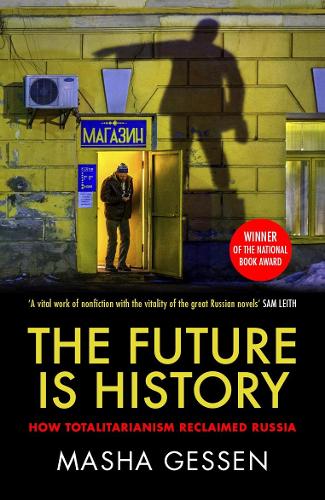
The Future is History: How Totalitarianism Reclaimed Russia
(Paperback)
Publishing Details
The Future is History: How Totalitarianism Reclaimed Russia
By (Author) Masha Gessen
Granta Books
Granta Books
25th July 2018
5th July 2018
United Kingdom
Classifications
General
Non Fiction
Political structure and processes
Reportage, journalism or collected columns
947.0860922
Physical Properties
Paperback
528
Width 129mm, Height 198mm, Spine 31mm
365g
Description
In The Future is History Masha Gessen follows the lives of four Russians, born as the Soviet Union crumbled, at what promised to be the dawn of democracy. Each came of age with unprecedented expectations, some as the children or grandchildren of the very architects of the new Russia, each with newfound aspirations of their own - as entrepreneurs, activists, thinkers and writers, sexual and social beings. Gessen charts their paths not only against the machinations of the regime that would seek to crush them all (censorship, intimidation, violence) but also against the war it waged on understanding itself, ensuring the unobstructed emergence of the old Soviet order in the form of today's terrifying and seemingly unstoppable mafia state.
The Future is History is a powerful and urgent cautionary tale by contemporary Russia's most fearless inquisitor.
Reviews
Indispensable -- Pankaj Mishra * Guardian *
The Future is History is a beautifully-written, sensitively-argued and cleverly-structured journey through Russia's failure to build democracy. The difficulty for any book about Russia is how to make the world's biggest country human-sized, and she succeeds by building her story around the lives of a half-dozen people, whose fortunes wax and wane as the country opens up, then closes down once more. It is a story about hope and despair, trauma and treatment, ideals and betrayal, and above all about love and cynicism. If you want to truly understand why Vladimir Putin has been able to so dominate his country, this book will help you -- Oliver Bullough
Masha Gessen is a brave and eloquent critic of the Putin regime -- Edward Lucas * The Times *
Impassioned * Daily Telegraph *
In The Future is History, Masha Gessen demonstrates how nostalgia has changed the fabric of Russian society. More than 25% of Russians believe that Stalin's rule was good for the country. Gessen's analysis reveals how imperial nostalgia goes hand in hand with an increase in nationalism, isolationism, sexism and homophobia... Memory is a responsibility. We ought to remember the past, not only in its polished glories but also its atrocities and injustices -- Elif Shafak * Guardian *
Author Bio
Masha Gessen is a journalist and the author of several books including Blood Matters and The Man Without a Face, which was longlisted for the Samuel Johnson Prize 2012. She has contributed to the New York Review of Books and the New Yorker. She has been described as Russia's leading LGBT rights activist, and served as a member of the board of directors for the Moscow-based LGBT rights organization "Triangle" from 1993 to 1998. She lives in New York.
